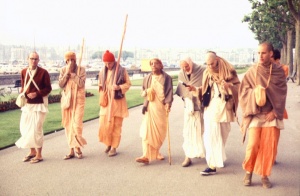CC Madhya 4.124 (1975)

A.C. Bhaktivedanta Swami Prabhupada
TEXT 124
- premāmṛte tṛpta, kṣudhā-tṛṣṇā nāhi bādhe
- kṣīra-icchā haila, tāhe māne aparādhe
SYNONYMS
prema-amṛte tṛpta—being satisfied only in the loving service of the Lord; kṣudhā-tṛṣṇā—hunger and thirst; nāhi—not; bādhe—impede; kṣīra—for sweet rice; icchā—the desire; haila—became; tāhe—for that reason; māne—he considers; aparādhe—offense.
TRANSLATION
A paramahaṁsa like Mādhavendra Purī is always satisfied in the loving service of the Lord. Material hunger and thirst cannot impede his activities. When he desired to taste a little sweet rice offered to the Deity, he considered that he had committed an offense by desiring to eat what was being offered to the Deity.
PURPORT
It is advisable that food being offered to the Deity be covered when taken from the kitchen to the Deity room. In that way, others may not see it. Those who are not accustomed to following the advanced regulative devotional principles may desire to eat the food, and that is an offense. Therefore no one should be given a chance to even see it. However, when it is brought before the Deity, it must be uncovered. Seeing the food uncovered before the Deity, Mādhavendra Purī desired to taste a little of it so that he could prepare a similar sweet rice for his Gopāla. Mādhavendra Purī was so strict, however, that he considered this to be an offense. Consequently he left the temple without saying anything to anyone. The paramahaṁsa is therefore called vijita-ṣaḍ-guṇa. He must conquer the six material qualities-kāma, krodha, lobha, moha, matsarya and kṣudhā-tṛṣṇā (lust, anger, greed, illusion, enviousness and hunger and thirst).